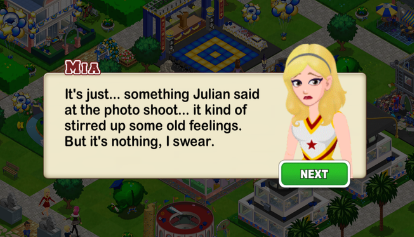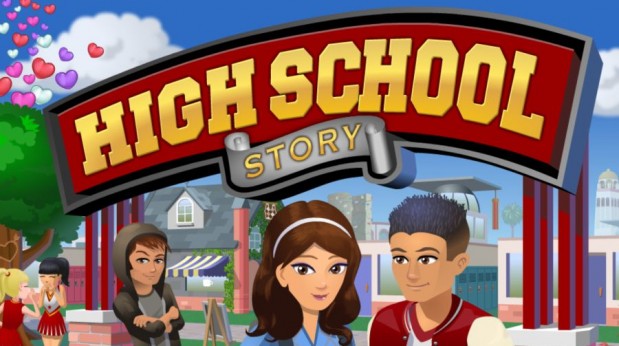Working with the National Eating Disorders Association, High School Story has updated to include new gameplay focused on changing the way teens view themselves in light of an obesity epidemic that follows adolescents well out of middle and high school. The developers found that both boys and girls report being unhappy with their bodies which feels like such a betrayal to the nature of school. I think a lot of gamers share this awareness that they don't look as good as they might want to and harboring that kind of feeling beyond secondary school might really hurt their ability to interact with people or find careers working in the medium they love.
The latest version of High School Story follows Mia, a character "who overhears an insensitive comment about her physique" and then falls into an unhealthy diet and exercise regimen. The developers were generous enough to answer a few of my questions about this update. Don't forget to read our original interview with Pixelberry Co-Founder Oliver Miao on High School Story's mission.
GameRevolution: How might players achieve moderation not just in how they address peers, but in how they view themselves, their lives, and (in this case) their diets by playing High School Story?
Oliver Miao: Throughout our game, we really try to focus the overall story of the game on two key messages.
1. Be proud of yourself.
2. Have empathy for those around you.
The main story focuses on a group of students who didn’t always fit in at their old schools who come together to form a more ideal school. They’re a diverse group who reflect real-world racial diversity. They don’t always get along, but over time they learn more about each other and gain respect and understanding for each other.
This message extends to how we’ve incorporated both our cyberbullying, body image, and eating disorders storylines into the game. And these messages really do get through. We’ve had players reach out to us both about the challenges they’ve faced and the successes they’ve had.
For example, a girl who’d just moved to a new school in another country contacted us because she was feeling a lot of pressure to change who she was in order to fit in. But she said that after playing High School Story, she realized that she didn’t have to look and act like everyone else in order to feel good about herself. We’re always touched and amazed by these responses, and feel very lucky to be able to impart these sorts of messages with our game.
 GR: Does the update to High School Story encourage not just understanding and empathy regarding eating disorders, but eating healthy as well? If so, how does the game accomplish this message?
GR: Does the update to High School Story encourage not just understanding and empathy regarding eating disorders, but eating healthy as well? If so, how does the game accomplish this message?
OM: That’s a great question. High School Story primarily encourages teens to be willing to talk about body image issues and eating disorders with their friends and community. That’s a great first step in getting help. But through our partnership with the National Eating Disorders Association (NEDA) any players who have questions about either of these issues can get answers from trained NEDA staff directly via our in-game support.
Interestingly, in an earlier version of our body image-themed storyline, we included specific details about some of the crash diets our in-game characters were on. However, NEDA recommended that we leave specific details out as they could be a dangerous trigger for people who are suffering from eating disorders or who are at risk for developing one. They said that type of information can be taken as a challenge to eat less—which is the opposite of what we’re trying to do.
We’re really grateful for NEDA’s input on this sensitive issue.
GR: I'm curious to know how High School Story might address challenges teenagers have in addressing issues and starting dialogues with their parents. My experience in high school was kind of a roller coaster and I felt like I couldn't talk to my mom and dad about certain aspects. I frequently felt like I didn't want to bother them with my problems because they seemed so trivial. What kind of story might the team craft to address these kinds of issues in the future?
OM: That’s a great topic for us to cover in the future. I can definitely relate to this. When I was being bullied in junior high, I never told my mom about it. In fact, she didn’t find out about it until this year when I was telling her about what we’ve achieved with our cyberbullying campaign!
For our earlier anti-cyberbullying campaign, one of our biggest priorities was modeling ways for teens to ask parents and other responsible adults for help with the issue. The Cybersmile Foundation, our nonprofit partner for that campaign, provided useful input and strategies on how to start those conversations. Encouraging open dialogue is a big priority for this new campaign as well, and NEDA has provided some great tips on how teens can start discussions about eating disorders with both parents and friends.
We haven’t yet discussed a storyline that specifically focuses on communication between parents and teens, but we definitely plan to continue encouraging it as part of addressing serious issues in High School Story.







